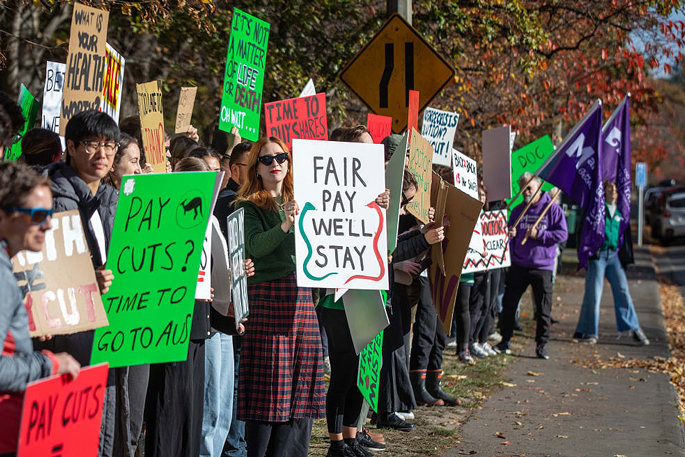Junior doctors are striking for the third time this month today, with 290 Blood Service laboratory workers also walking off the job this week.
Te Whatu Ora has accused the unions of knowingly scheduling the strikes at the same time to cause maximum disruption, saying the dual action will compound the impact on patients.
Hundreds of operations were postponed in last week's strike.
More surgeries are being deferred on Friday.
Te Whatu Ora chief people officer Andrew Slater says there's concern both strikes are under way at the same time, causing a lot of disruption.
"But we've got plans in place that we need to have in place to safely deliver care."
There's an 18 per cent pay offer on the table for the junior doctors and Te Whatu Ora has been in facilitation with the union, he says.
The facilitator is set to make a formal recommendation next week, he says.
The employment agreements for young doctors are very complex, Andrew says.
"The offer on the table is between 3 and 29 to 30 per cent with an average of 18 per cent."
The blood lab workers started their industrial action on Wednesday by not working any extra hours, and are going on strike for four hours on Friday.
The PSA - which represented the lab workers - says the Blood Service and Te Whatu Ora are keeping a close eye on blood stocks and some staff will return to work if blood is needed for life-preserving reasons.
There's enough on hand for acute operations that can't be deferred, it says.
PSA union organiser Alexandra Ward says there's a 13 to 35 per cent difference in the pay that a worker with the same experience doing the same work received at the New Zealand Blood Service, compared to if they worked for Te Whatu Ora.
Te Whatu Ora settled a pay equity claim with administrators two and a half years ago, she says.
"So for an administrator that works for the New Zealand Blood Service that means it's two and a half years, back since January 1, 2022, accepting lower pay.
"That's really hard to handle and we've been negotiating about this for seven months, people are struggling to pay their bills now."
It's not coordinated with the doctor's strike but "I think it should be a signal that things are not right in our health system when there are multiple groups of workers going on strike simultaneously", she says.
The four-hour strike is part of wider action that includes not working extra hours and not processing AHF plasma, which was sent to Australia for commercial processing rather than directly to hospitals.
Next week, the workers will strike for 24 hours if the dispute has not been resolved.
They want the Blood Service to pay them the same as their hospital counterparts, and plan to strike for longer next week.
The junior doctors are part of the Resident Doctors Association which represents about half of all junior doctors, more than 2500 of them.
President James Anderson says Te Whatu Ora has barely moved on its demands for fair pay and for an end to back-to-back 15 hour weekend shifts.
It's also trying to "claw back" a 50-year-old clause that means doctors get $5000 when they pass their first exam, he says.
Te Whatu Ora chief people officer Andrew Slater says he's frustrated and disappointed the doctors are still going ahead with the strike, despite the Employment Relations Authority recommending they paused during facilitation.
The pay increase offer - between 3 and 29 per cent - is fair, he says.
Hospitals will remain open and patients should turn up to appointment unless contacted, he says.



0 comments
Leave a Comment
You must be logged in to make a comment.